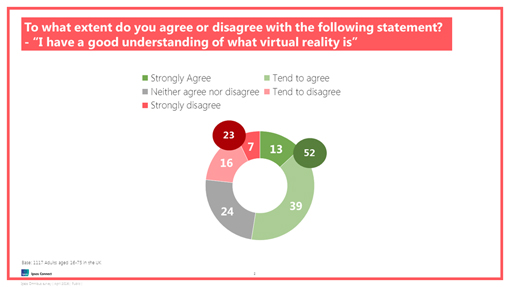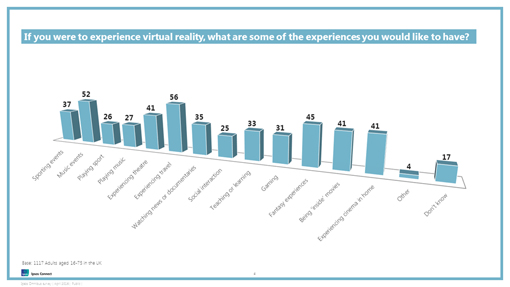Survey finds VR needs to overcome its image problem
Britons are enthusiastic about the potential of Virtual Reality (VR), but the perception it is only for gamers is a barrier to it becoming mainstream, a new survey published today finds.
According to the Ipsos poll of 1,000 British adults, half (52%) say they have a good understanding of virtual reality, (13% strongly agree they have a good understanding) and 47% want to try it out.

But despite the high awareness of VR, the study shows there are some barriers to widespread adoption. A third (34%) of people said they have no interest at all in the technology and a similar number (36%) think the devices are confusing. More hands-on experience of VR could be the answer to bridging the gap, as a majority (68%) agree that they would have to try it to make a better judgement about it. For a significant number, cost is a barrier, with some 66% of people agreeing that VR devices are too expensive, rising to 74% of 25 to 34 year olds.
Furthermore, the study uncovers uncertainty around the applications of VR. Crucially, most people (60%) feel that it is mainly for gamers at the moment, and 46% can’t see any practical uses for people like them. Even of those people who say they have good knowledge of VR, 43% agree that they don’t see a practical application for VR at the moment for people like them (compared with 56% of those with low knowledge).
On VR experiences they would like to have, people respond positively to a broad range of possible scenarios, but there’s a significant number who are unsure – 17% of people said they don’t know what they would want to experience. Among the most frequently mentioned types of experience were a music event like a concert (52%), travel (56%), fantasy experiences (45%), the theatre (41%), and movies (41%). Less frequently mentioned were sporting events (37%), news or documentaries (35%), teaching or learning (33%), gaming (31%), playing a sport (26%) or musical instrument (27%), or interacting with others (25%).

When considering where they would like to get virtual reality content, again there is uncertainty - 33% say they do not know. The most popular sources are broadcasters like the BBC or Sky (41%) or on-demand services like Netflix or Amazon Prime (29%), showing people are looking for established brands to take an active role in tipping VR into the mainstream. The Guardian recently launched its 6x9 project, a virtual reality recreation of being in solitary confinement. However, just 15% of people surveyed envisage news organisations’ websites as being platforms for VR content.
Commenting on the results, Neil Stevenson, Research Manager, Ipsos Connect said:
“VR is at a crossroads. On one hand there’s this amazing technology and an enthusiastic cadre of media and tech people pushing to popularise it; however, in the minds of consumers, VR is currently a technology without application. There’s a gap between the technology, the content, and experiences. Consumer interests, wants and needs are not yet fully formed. They are open to many experiences and are looking to established brands – particularly broadcasters - to provide these.”
Technical note
Fieldwork was carried out between 22nd April and 26th April 2016. 1117 UK adults aged 16+ were interviewed and results were weighted to be nationally representative of the offline population. Interviews were carried out online through the Ipsos panel.



